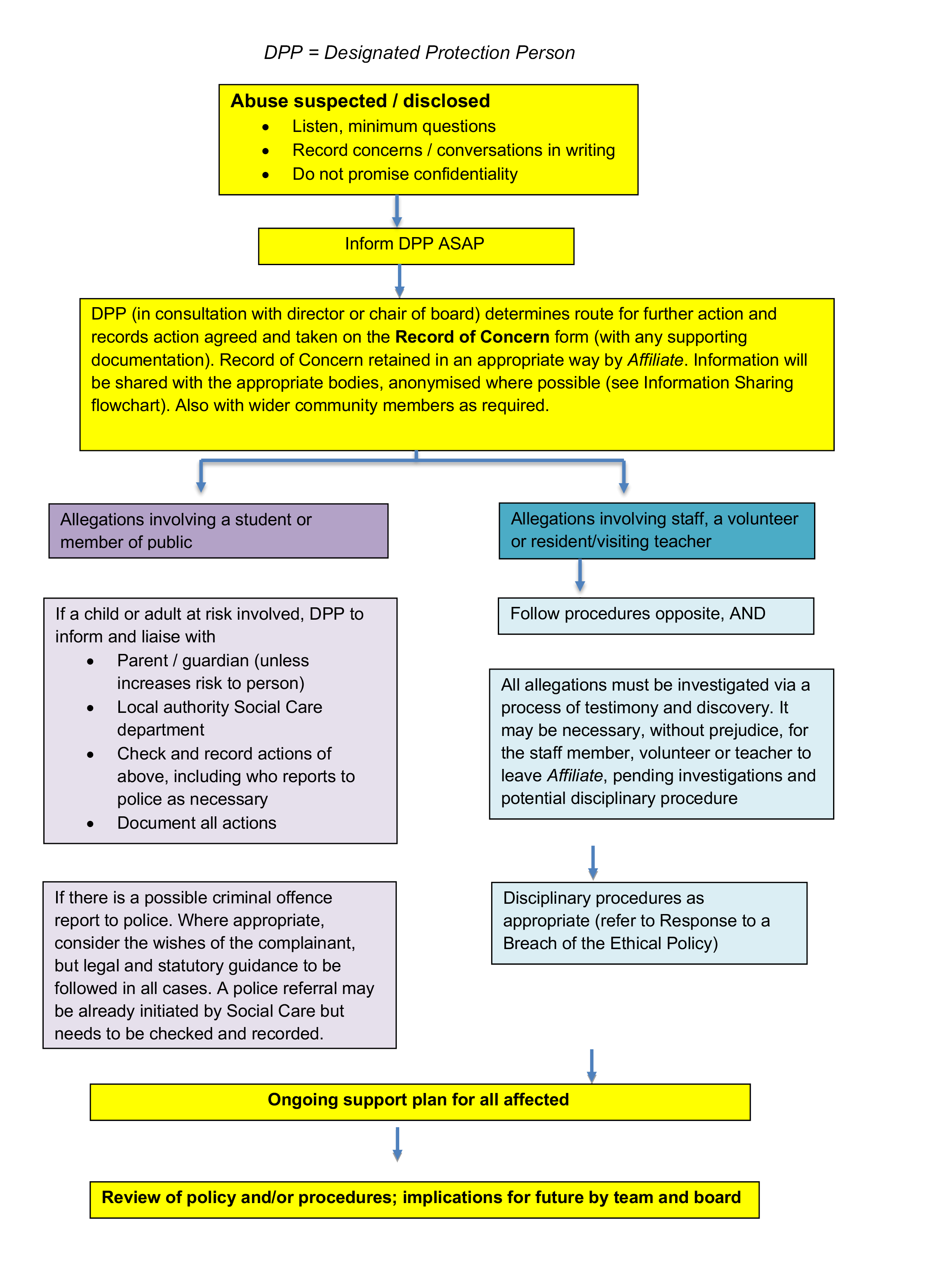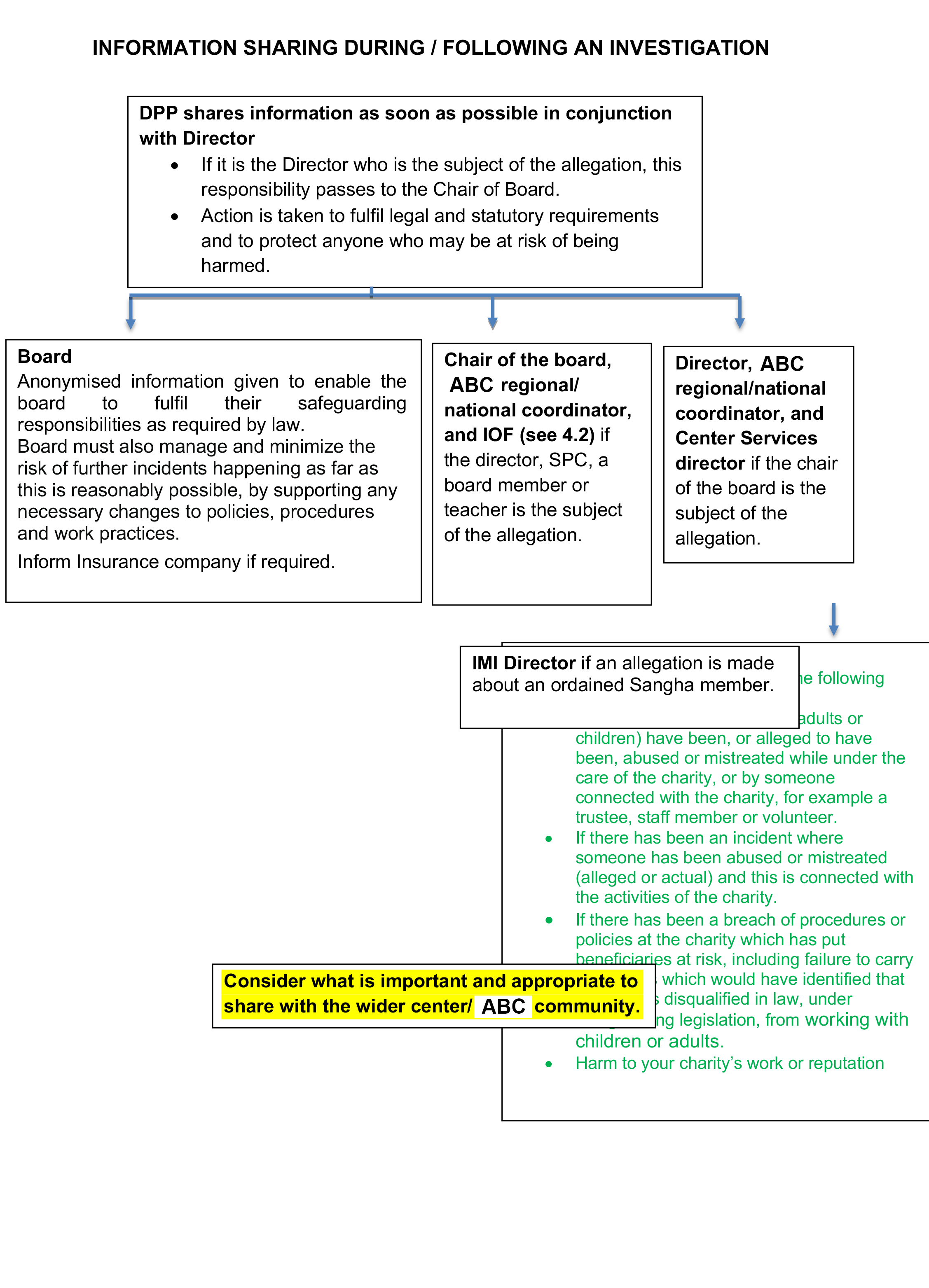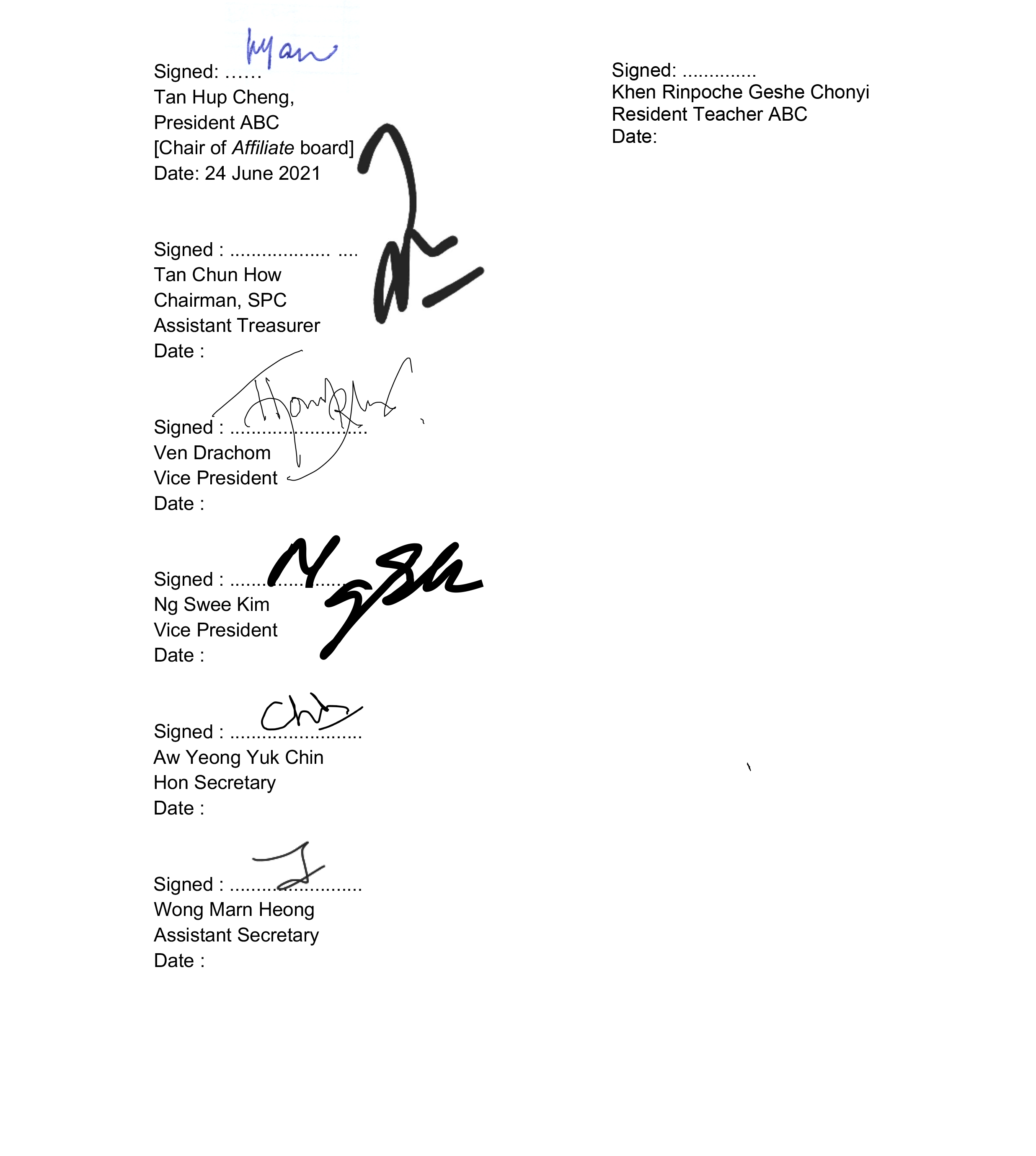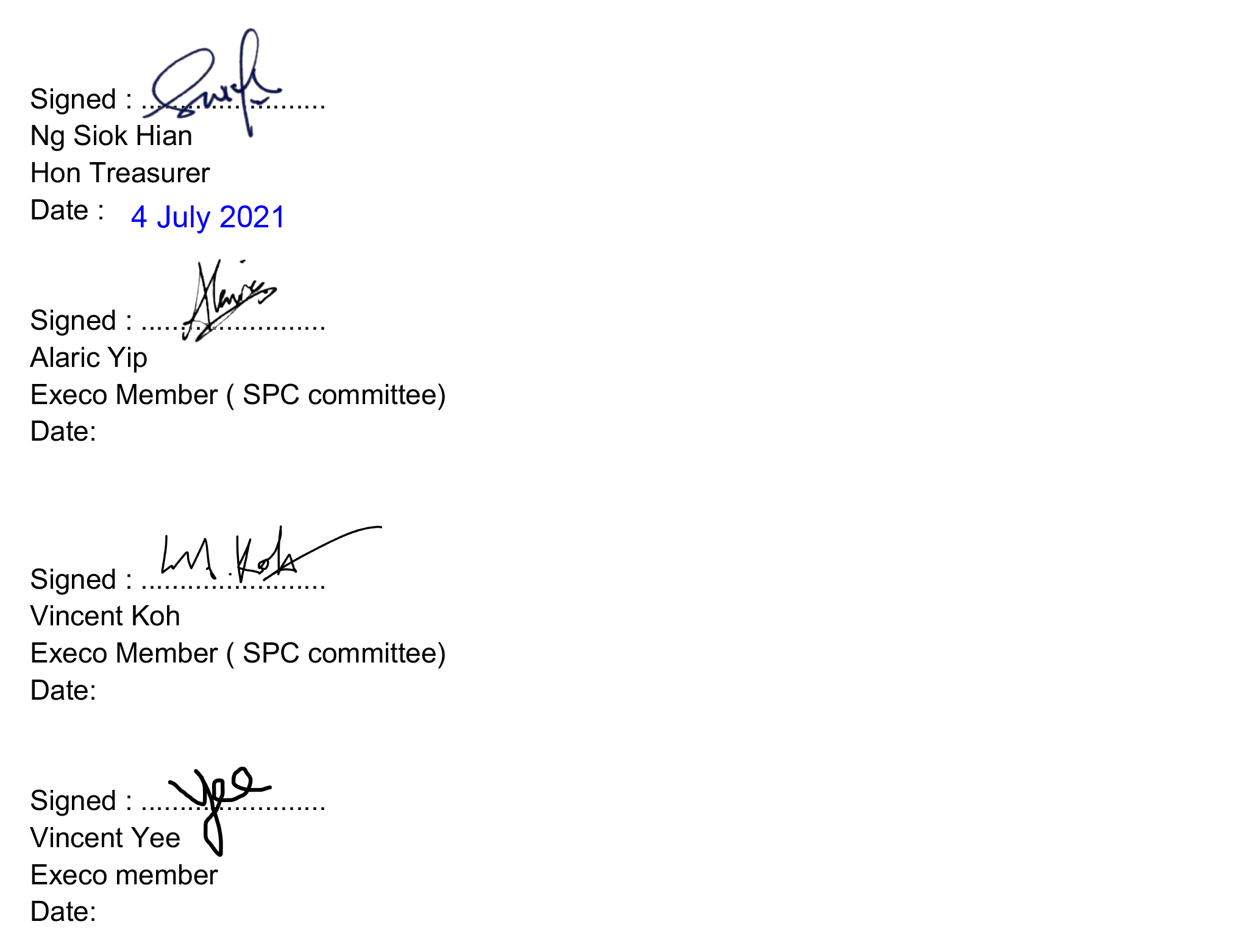|
CONTENTS (Version March 2021):
- Introduction
1.1 Affiliate Description
1.2 Our Commitment
1.3 Protecting Everyone from Abuse
1.4 People with Designated Responsibility
- Confidentiality
- Prevention
3.1 Understanding Abuse
3.2 How Might we Recognize Signs of Abuse
3.3 How Might we Become Aware of Abuse
3.4 Clear Provision of Public Information
- Our Commitment to Safe Practice
4.1 Affiliate Commitment
4.2 Working in Partnership with ABC.
- Practice Guidance
5.1 Recruitment of Staff and Volunteers
5.2 Code of Behaviour for Staff and Volunteers
- Responding to Concerns and Allegations
6.1 Receiving, Responding to and Reporting an Allegation or Concern
6.2 Allegations against Workers
6.3 Procedures Flow Charts
- Care and Support
7.1 Guiding Principles
- Contact Information
8.1 Affiliate Contact Details
8.2 Local Contacts For Reporting Abuse If Necessary
- Additional Information And Resources
9.1 ABC Policy and Guidelines
9.2 Resources
- Record of Concern
- Policy Review
| 1.1 |
AFFILIATE DESCRIPTION |
| |
Affiliate is an ABC center/project/service. We strive to fulfil the ABC mission statement, with a particular focus on dharma teachings. All in positions of authority and leadership in this center/project/service have signed an acknowledgement to abide by the ABC Ethical Policy. |
| |
|
| 1.2 |
OUR COMMITMENT TO PROTECTING FROM ABUSE |
| |
Affiliate is committed to protecting people attending the center/project/service from harm and abuse. We will also ensure that all staff and volunteers work together, in line with this Protecting from Abuse policy, and act promptly when dealing with allegations or suspicions of abuse or inappropriate behavior.
We acknowledge that children, young people and adults can be the victims of physical, sexual and psychological abuse, and neglect. We accept the UN Universal Declaration of Human Rights and the International Covenant of Human Rights, which states that everyone is entitled to “all the rights and freedoms set forth therein, without distinction of any kind, such as race, colour, sex, language, religion, political or other opinion, national or social origin, property, birth or other status”. We also concur with the Convention on the Rights of the Child, which states that children should be able to develop their full potential, free from hunger and want, neglect and abuse. |
| |
|
| 1.3 |
PROTECTING EVERYONE FROM ABUSE |
| |
Everyone associated with Affiliate has a right to be protected from all forms of physical or mental violence, injury or abuse, neglect or negligent treatment or exploitation, including sexual abuse.
We sometimes use the term ‘safeguarding’ to describe everything we do to keep people safe, protect them from abuse, and act appropriately if anyone has been abused.
Protecting from Abuse is Everybody’s Responsibility
We will work together to prevent and minimize the risk of harm or abuse. If we have concerns that someone is at risk of being abused our first duty is to the individual concerned.
Doing Nothing Is Not An Option
If we know or suspect that someone is at risk, we will respond and ensure our concerns are properly recorded. We will respond according to this policy and other Affiliate procedures. |
| |
|
| 1,4 |
PEOPLE DESIGNATED FOR PROTECTING FROM ABUSE |
| |
Each such individual is known as a Designated Protection Person.
(Small affiliates can delete one, or maximum two, from a, b, c and d below).
a) Affiliate onsite person.
b) The Director.
c) Board member with oversight of Protecting from Abuse, who will support the
Designated Protection Person and oversee the development of Protecting from Abuse
policy and practice.
d) Chair of the Board.
IF YOU HAVE ANY CONCERNS –TELL THE DESIGNATED PROTECTION PERSON |
Affiliate is committed to respecting the right to confidentiality of everyone at the center.
However sometimes it is necessary to share information to ensure a person’s wellbeing. For example, there may be a statutory requirement; or sometimes practical information needs to be shared with the staff and volunteer team. Occasionally, sensitive information may be shared in this way. Such sharing will only include those who need to know and the information necessary to ensure that the person is protected from harm and abuse and that proper processes are followed if they have been harmed.
Under Affiliate’s Confidentiality Policy, staff, volunteers, and teachers who are informed that a person may have been abused or be at risk of abuse, or are made aware of circumstances in which someone is at risk, may need to share sensitive information in order to take practical steps to protect the person at risk. These circumstances include:
- If the participant is under 18 and they disclose information that may indicate risk to themselves or other children or young people;
- If an adult discloses past child abuse and it is known that children or young people are currently at risk from the abuser;
- If a staff member, teacher, or volunteer believes that a participant could cause danger to themselves or to others;
- If the participant gives information that indicates that a crime has been committed;
- If the participant gives information that indicates a possible terrorist threat.
Also, refer to 4.2, Working in Partnership with the ABC Organization.
In any of these cases, the person at risk will be informed that the disclosure they are making may not be kept confidential. If a decision has to be taken to break confidentiality, it will be done only after consultation with a Designated Protection Person and the Director. Any disclosure will be shared internally or with external agencies as required while respecting the person’s privacy as much as possible.
| 3.1 |
UNDERSTANDING ABUSE |
| |
Abuse is a violation of an individual’s human and civil rights by any other person or group of people.
Abuse may be single or repeated episodes. It is not only harming somebody; it also includes neglect of their basic needs or failure to protect them from harm. |
| |
|
| 3.2 |
HOW WE MIGHT RECOGNISE SIGNS OF ABUSE |
| |
This section considers the different types and patterns of abuse. This is not intended to be an exhaustive list but an illustrative guide as to the sort of behavior which could give rise to a concern regarding abuse.
- Physical: including hitting, slapping, pushing, restraining or inappropriate uninvited touching. Intimate partner violence. Self-harm.
- Psychological and emotional: including harassment, blaming, humiliation, threats of harm or abandonment, intimidation, verbal abuse and coercion.
- Financial: including the illegal or unauthorized use of a person’s property, money or other valuables, pressure in connection with wills, property or inheritance. Modern slavery, and human trafficking.
- Sexual: such as forcing a person to take part in any sexual activity without his or her informed consent.
- Discriminatory: including racist or sexist remarks or comments based on a person’s age, race, sex, national origin, disability, pregnancy, marital status, sexual orientation, medical condition or illness; and other forms of harassment, slurs or similar treatment. This also includes stopping someone from being involved in other cultural activity, services or support networks.
- Institutional: the collective failure of an organization to provide an appropriate and professional service, especially to vulnerable people. This includes a failure to ensure the necessary safeguards are in place to protect people and maintain good standards of care in accordance with individual needs, including training of staff, supervision and management, record keeping and liaising with other providers.
- Misuse of spiritual authority or power. This can take the form of all of the abuses listed above. Furthermore, all forms of abuse have the potential to cause damage to the individual’s emergent spirituality. Holding a spiritual position or role involves differing power relationships and imbalances and these need to be recognised to respect the autonomy or rights of the individual.
Some abuse is spiritual abuse because of the context in which it occurs, or where it
invokes status as a teacher or someone of higher spiritual authority, or uses religious
teachings to coerce or manipulate people into performing behaviors which meet the
needs of the abuser rather than those of the individual concerned. In some cases, it
may be well intentioned rather than malicious, but nevertheless is harmful, as it
overrides the respect of an autonomous individual’s right to make informed choices
regarding their own lives and spiritual practices, for example due to fear, shame,
humiliation etc.
|
| |
|
| 3.3 |
HOW MIGHT WE BECOME AWARE OF ABUSE |
| |
Concerns about or evidence of abuse can come to us through:
1. A direct disclosure by the person concerned.
2. A complaint or expression of concern by a staff member, a volunteer, another center
user, a carer or caregiver, a member of the public, or relative.
3. An observation of the behavior of the person at risk. |
| |
|
| 3,4 |
CLEAR PROVISION OF PUBLIC INFORMATION |
| |
It is essential that staff, volunteers, and members of the public know who to contact if there are any concerns about abuse at Affiliate. How to access relevant information, including the relevant policies and reporting procedures, together with who to contact must be available on a suitably-placed notice board on the premises, and on the website.
|
4. OUR COMMITTMENT TO SAFE PRACTICE
4.1 AFFILIATE IS COMMITTED TO:
-
Identifying abuse.
- Responding effectively to concerns and formal complaints.
- Creating a safe space for everyone at Affiliate.
- Regularly monitoring and evaluating the effectiveness of our policies, procedures and
practices for protecting people.
- Ensuring that our policies, procedures and practices stay up to date with good practice
and the law in relation to protecting from harm and abuse.
The center will use various channels for informing everyone about who are the Designated Protection Persons and how to contact them, along with how to access this policy.
Staff, volunteers and facility users are entitled to respect, and protection from harm and abuse. We aim to give everyone a positive and rewarding experience.
We recognize that Dharma practice can be a powerful experience that brings underlying issues to the surface. In the event that participation in a course brings underlying issues to the surface, or reveals some form of mental or emotional disability, the teacher or Designated Protection Persons may recommend that the course participant seek suitable professional support. We aim to respond empathically in such circumstances.
It is important for staff and students to appreciate the limits of teachers’ and volunteers’ role, time, and skills. On some occasions we will suggest that suitable professional support is required.
Statutory and legal responsibilities:
There may be serious incidents, involving children under 18 or ‘adults at risk of harm’. In these cases, there may be a statutory or legal requirement to inform the local authority and other relevant agencies to ensure protection from significant harm or abuse.
(In the UK, for example, an ‘adult at risk’ is defined as a person aged 18 years or over, who may be in need of community care services by reason of mental or other disability, age or illness; and who is or may be unable to take care of him or herself, or unable to protect him or herself against significant harm or exploitation.)
We recognize that everyone can be vulnerable at times, due to life events. Therefore, this policy covers not only children and adults at risk, but also everyone at Affiliate. However, the response to any incident may vary according to the legal and statutory guidance for different groups.
4.2 WORKING IN PARTNERSHIP WITH THE ABC ORGANIZATION
Affiliate is committed to working in partnership with the ABC organization to develop good practice for preventing harm and abuse. This includes adopting ABC policies and attending training provided by ABC.
Affiliate will discuss their local context with the director at ABC, in order to consider together where local jurisdiction and practices need to be taken into account and reflected in their policy.
Affiliate will inform the ABC director and their local ABC regional and/or national coordinator of any allegations of concerns regarding abuse about a board member, director, spiritual program coordinator, and resident teacher, and action taken.
Affiliate will inform the ABC's director and their local ABC regional and/or national coordinator of any allegations of concern regarding abuse about a registered or Tibetan teacher, and action taken.
Affiliate will inform the ABC director of any allegations of concerns regarding abuse about a monk or nun, and action taken.
Reporting to the relevant individual within the ABC organization will not indicate failure on the part of Affiliate but will rather indicate vigilance and a commitment to protecting from harm and abuse.
5.1. RECRUITMENT OF WORKERS, TEACHERS AND VOLUNTEERS
Workers, teachers, introductory class leaders and volunteers at the center are in a position of trust. We recognize that it is important that vetting processes are in place to ensure that no one who may pose a risk of abuse or harm is put in such a position.
5.2 CODE OF BEHAVIOR FOR STAFF AND VOLUNTEERS
You Must Avoid:
-
Spending time alone or making unnecessary physical contact with children or adults at risk.
- Arranging private meetings of students with teachers anywhere other than in Affiliate’s designated meeting areas or public places. This also applies to online meetings and courses.
- Non-consensual touching in general.
- Meeting alone with children and adults at risk associated with Affiliate, outside of the
work environment.
- Investigative questioning after an allegation or concern has been raised. Instead, listen with an open mind in a caring manner. Then record the information and report it to the Designated Protection Person, who will notify the appropriate authorities if required.
You Should Never (Even in Fun):
-
Initiate or engage in sexually provocative conversations or activity.
-
Allow the use of inappropriate language to go unchallenged.
- Do things of a personal nature for children or adult at risks that they can do themselves.
- Trivialise or exaggerate child or adult abuse issues.
- Allow any allegations made by a child or adults, students, staff, or volunteers, to go
without being reported and addressed.
- Make promises to keep any disclosure confidential from relevant authorities.
Regarding All Your Relationships Within and Around Affiliate:
- Respect everyone’s right to privacy.
- Help create a culture in which everyone feels able to report experiences of harmful, uncomfortable attitudes or behavior.
- Act with discretion with regards to your personal relationships. Ensure your personal relationships do not undermine harmony or impact on your capacity for impartiality.
- Be aware that conflicts of interest can arise, leading to misunderstandings. This can happen particularly where there is an imbalance of power or close personal relationship. Where such potential situations arise, one should discuss this with the Director, and possibly the team as relevant.
- Be aware of the procedures for reporting concerns or incidents and how to contact the Designated Protection Person.
- Should you find yourself the subject of inappropriate affection or attention from anyone, it is essential to record this, including the date and time, and report it to the Designated Protection Person.
- Report any concerns to one of the Designated Protection People. If they are not available, tell another responsible person at the Affiliate.
- Maintain appropriate boundaries with others at Affiliate. Be aware of the scope of your role and when necessary, pass information to those whose role it is to deal with specific matters. Be careful not to give personal or Dharma advice to individuals that goes beyond your expertise or role. Respond with empathy and kindness, rather than being drawn into giving expert advice. If there are concerns that a person might need further help this should be reported to the Designated Protection Person or Director.
- Study, sign and abide by the ABC Protecting from Abuse policy and the ABC Ethical Policy.
6. RESPONDING TO ALLEGATIONS AND CONCERNS Under no circumstances should a worker or volunteer carry out their own investigation into an allegation or suspicion of abuse.
Suspicions must not be discussed with anyone other than those nominated above. A written record of the concerns should be made in accordance with these procedures and kept in a secure place.
6.1 RECEIVING, RESPONDING AND REPORTING AN ALLEGATION OR CONCERN
-
Never promise unconditional confidentiality.
- Explain that if the person expressing the concern may have been abused or be at risk of abuse you may need to tell someone. Explain the role of the Designated Protection Person.
- Listen very carefully.
- Only ask questions to clarify your understanding.
- Do not ask searching questions – this could compromise a future investigation.
- Offer reassurance and thank the person for telling you.
- Tell the person you will try to get them the help they need.
Explain what you will do, e.g. tell the Designated Protection Person.
6.2 ALLEGATIONS AGAINST WORKERS
If an allegation is made against a worker (whether a volunteer or paid member of staff) whilst following the procedure outlined above, this must be reported immediately to the Designated Protection Person (unless they are the subject of the allegation) and the Director (unless they are the subject of the allegation).
All allegations or concerns regarding the director, spiritual program coordinator, and resident and/or registered teacher/s must be reported to the Center Services or Teacher Services director as appropriate at International Office (as explained in 4.2 above), and to the ABC coordinator.
6.3 PROCEDURES FLOW-CHARTS


Affiliate is committed to offering care and support, working with statutory agencies as appropriate, to all those who have been affected by abuse who have contact with or are part of the Affiliate. This may include the alleged victim and the alleged perpetrator. Support may be needed for the wider community also.
7.1 GUIDING PRINCIPLES
-
Prioritize the wellbeing and safety of all who reside, visit or come into contact with the Affiliate.
- Never promise to keep anything reported confidential. It should be explained at the outset that any disclosure will be shared internally or with external agencies as required. However, the person’s privacy will be respected as much as possible.
- For the purposes of recording, it is important to listen. Questions should be kept to the minimum necessary to understand what is being alleged, and leading questions avoided. (The use of leading questions can cause problems for any subsequent investigation and court proceedings.)
- All those involved should take great care in reaching conclusions and making decisions. Regarding sharing information within the center, confidentiality and privacy of all the individuals concerned should be protected as appropriate and feasible. When the process is complete, consideration should be given to what is appropriately shared with the wider Affiliate community.
- Whatever action you may have to take, and even if the authorities are involved, don’t lose sight of the person or persons at the center of the concern. Ensure that there is someone to whom they can turn for support after any allegation or investigation. If they give further information, then go through the process of listening and recording as already described.
- When dealing with adults at risk, their wishes, feelings and mental capacity must be taken into account and people should be supported to make their own decisions and encouraged to give informed consent when possible and safety considerations permit.
- Be aware that although the particular individual that has disclosed abuse may now be safe and protected, it is important to think about the potential risk to others from the alleged perpetrator. If the matter is serious, inform the appropriate agencies as required, and also pass information to those who may need be aware in order to protect others.
- It is important to think carefully how best to maximize everyone’s rights to privacy as much as is feasible. There will be people with whom information needs to be shared. In many cases this could be anonymised, and the person’s name only be shared with those where this is essential. Consider carefully what is shared by email, particularly bearing in mind data protection considerations, and again anonymise where feasible, or encrypt and password protect documents with names of alleged perpetrators and those who have been harmed.
- The Affiliate needs to make clear decisions to promote the wellbeing and safety of all they come into contact with. However, it is important to maintain equanimity towards all those involved in any allegation and at the same time ensure robust safeguarding procedures. Respect and compassion need to be shown to both the person harmed and the alleged perpetrator, and where appropriate and feasible, care and support given.
8.1 AFFILIATE CONTACT DETAILS
-
Designated Protection Person (DPP)
Name, phone number, email address of each DPP
- Board Chair (Designated Protection Person) Name, phone number, email address
- ABC mandated contacts:
- Regional and/or national coordinator
- ABC Center Services director
- ABC Teacher Services director
- IMI director
8.2 LOCAL CONTACTS FOR REPORTING ABUSE IF NECESSARY
-
POLICE CONTACT INFORMATION
-
Any relevant local body
9. ADDITIONAL INFORMATION AND RESOURCES
9.1 ABC POLICIES AND GUIDELINES
Ensure ABC Policies and guidelines are available, understood and followed.
9.2 RESOURCES
-
Local Safeguarding Organization/s
- Thirtyone:eight https://thirtyoneeight.org/
Thirtyone:eight is a UK based safeguarding charity, which is consulted by churches and other organisations. They also advise other faith groups and a wide variety of statutory and third sector organisations with safeguarding concerns. They have a 24-hour advice helpline and also offer training and other resources.
- An Olive Branch www.an-olive-branch.org
A USA based organization formed in 2011 as a project of the Zen Center of Pittsburgh. Growing out of the need for greater understanding and reduction of ethical misconduct on the part of religious leaders, they provide services to organisations in conflict after a teacher has been accused of misconduct. In the USA they promote understanding and healing and work to strengthen organisations’ boards and policies to reduce the likelihood of future misconduct. They also have some information and resources available on their website.
- National Children’s Charity, if appropriate
- Any relevant national bodies
Strictly Private and Confidential
| Name of the subject of the report |
|
| Contact information |
|
| Person initiating concern
|
|
| Concern or incident (information received)
|
|
| Date, time and location
|
|
| Any relevant additional information
|
|
| Action taken immediately (to be completed by Designated Protection Person to whom the report was made)
|
|
| Follow-up plan (by both designated protection people including the director)
State clearly if other agencies and ABC individuals were required to be contacted and when this was done
|
|
Name:
[print]
Signature:
Date: |
|
One copy to be retained confidentially by Affiliate: duration according to legal advice. Anonymised copy created by removing identifying details sent to chair of Affiliate board to confidentially share with other board members.
We are committed to reviewing our policy and good practice as and when necessary.
This procedure was last reviewed on: NOT APPLICABLE
............................................................................................ (Date)


|